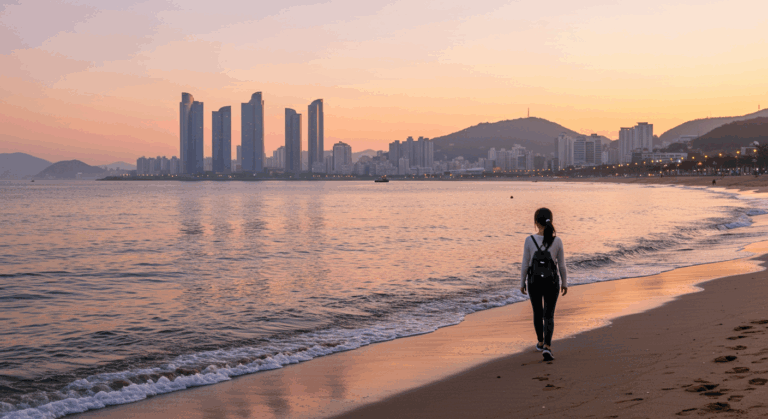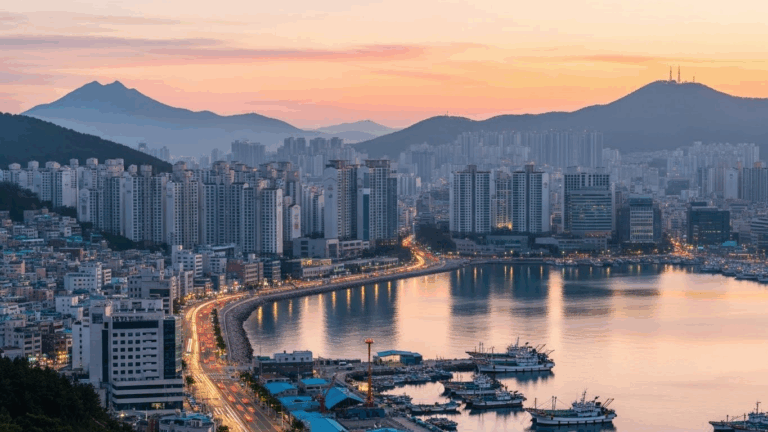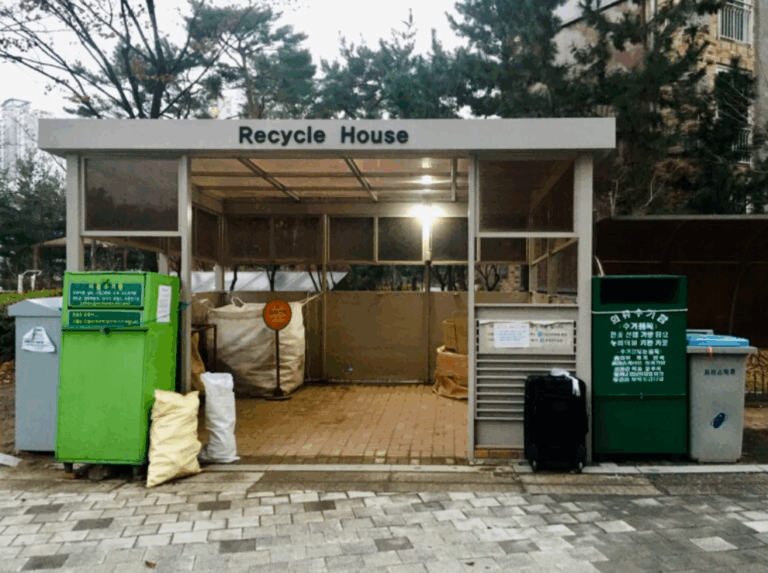When I walk along Gwangalli Beach in the early morning, I often notice something that shows what living in Busan as a foreigner really feels like —
a few foreigners sitting quietly with their coffee, watching the sunrise over the sea.
They look a little tired, a little lost, but also deeply curious.
It reminds me of the first time I met an American traveler years ago who told me,
“Busan feels different. It’s not just another city — it’s a feeling.”
That stayed with me.
I was born and raised in Busan, and now I help foreigners understand this city the way locals really live it — not from travel brochures, but from the quiet details of everyday life: the smell of dried fish from Jagalchi Market, the sound of dialect at a corner café, the sea breeze that finds you even downtown.
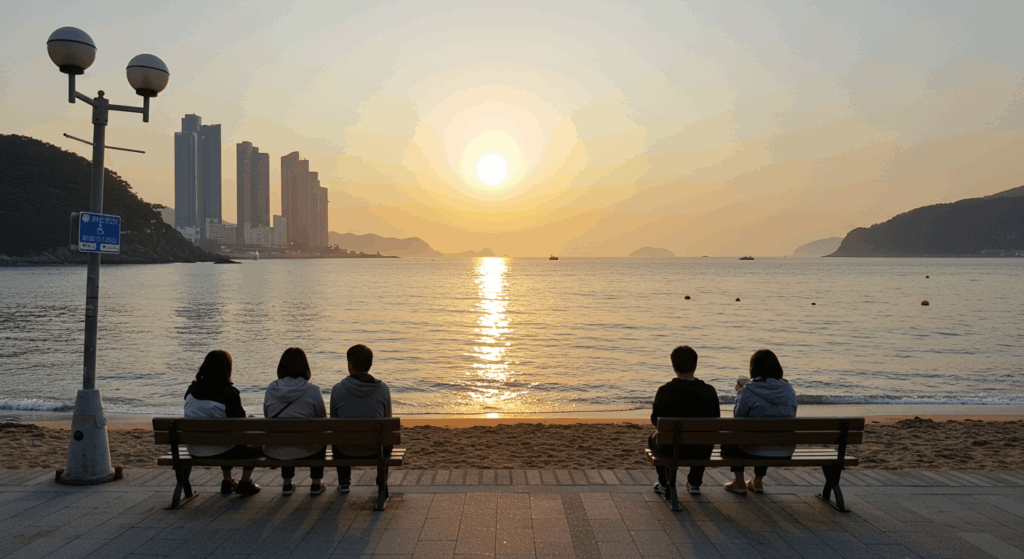
Welcome to Easy Korea Life,
where I share Korea as a Busan local — honestly, warmly, and sometimes with a bit of local humor.
🌊 1. The Rhythm of Busan — Slower, Warmer, and Proudly Different
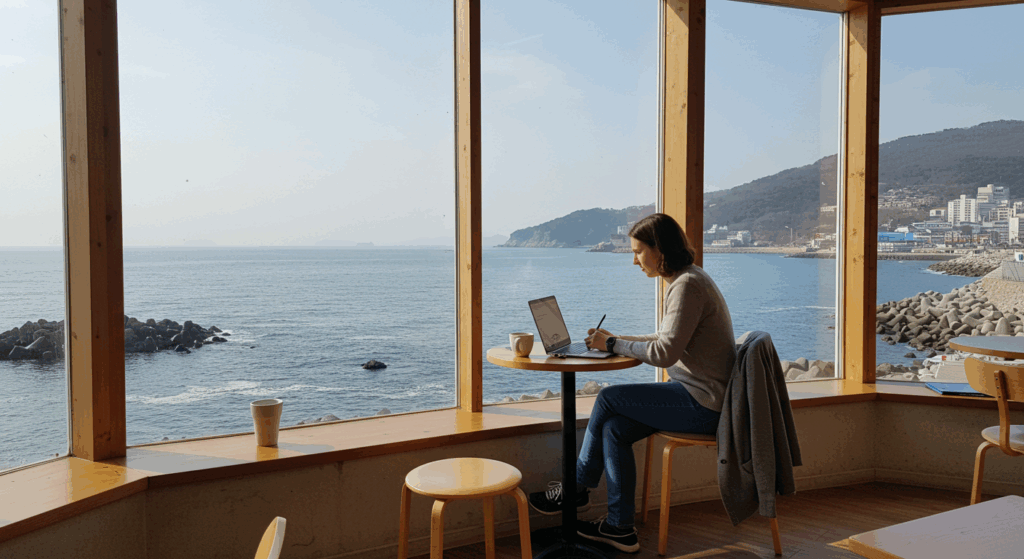
When most Koreans think of Busan, a few things instantly come to mind:
the sea, the accent, and the people’s bold character.
Ask someone from Seoul about Busan, and they’ll probably say:
“Busan people talk loudly, eat spicy food, and always go to the beach.”
And honestly — they’re right, but that’s just the surface.
Underneath that lively image, Busan has a rhythm of life that feels slower, warmer, and more genuine than any other city in Korea.
Unlike Seoul, where life moves like a machine, Busan has room to breathe.
You’ll see people chatting with neighbors in front of small shops, taxi drivers giving local restaurant tips, and groups of elderly friends sitting by the ocean, arguing passionately about baseball (especially the Lotte Giants, our local team that we love no matter how often they lose).
Here, “slow” doesn’t mean lazy — it means people still take time to live.
We still walk instead of rush, talk instead of text, and smile even when we’re tired.
This is the kind of city where bus drivers say hello, and the fish market ladies scold you if you skip breakfast.
Busan people are known across Korea for being straightforward but warm-hearted.
We don’t use fancy words; we say things as they are.
That honesty is sometimes mistaken for anger, but stay here long enough and you’ll realize — it’s actually affection in disguise.
🍜 2. Everyday Life in Busan — Where the Sea, the Market, and the Café Shape the Day
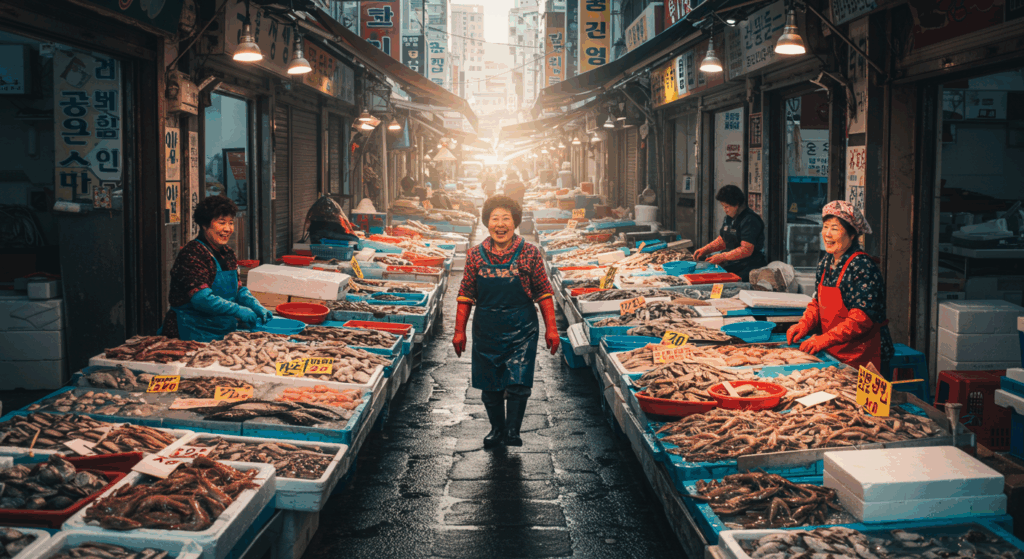
If you live in Busan, your everyday rhythm will likely revolve around three things: the sea, the market, and the café.
They’re not tourist attractions — they’re the heartbeat of our daily life.
🌊 The Sea
The ocean isn’t just a view — it’s part of who we are.
From almost anywhere in Busan, you can smell salt in the air or hear the sound of seagulls.
Many locals visit the beach not to swim but to think.
After a hard day, we often say, “Let’s go see the ocean,” as if the waves themselves could reset our minds.
Even in winter, you’ll find people sitting by the shore, drinking warm coffee in silence.
That quiet moment — wind, sea, and thought — is Busan’s therapy.
🛍️ The Market
Markets in Busan are loud, chaotic, and alive.
Vendors shout prices in dialect, old men argue about fish freshness, and everyone seems to know each other.
Places like Jagalchi Market or Bupyeong Market aren’t just where you buy food — they’re where you feel Busan’s soul.
Here, people living in Busan care more about sincerity than manners; if you smile and say “감사합니다” (thank you), you’ll probably get extra side dishes or a laugh in return.
Markets are where Busan locals teach foreigners what “community” really means.
☕ The Café
And then there’s the café — the city’s modern temple.
Busan has one of the most creative café scenes in Korea, often with panoramic ocean views.
Locals go not just for coffee, but for peace.
It’s common to see someone sitting for hours facing the waves, doing nothing but breathing.
No one rushes you out; time slows down with the tide.
It’s in those moments — with a latte and the sound of the sea — that you realize why so many people fall in love with this city.
Everyday life in Busan might seem ordinary, but there’s a quiet beauty to it.
The kind that doesn’t scream for attention — it just waits for you to notice.
🗣️ 3. The Accent and the Honesty — Busan’s Way of Speaking the Heart
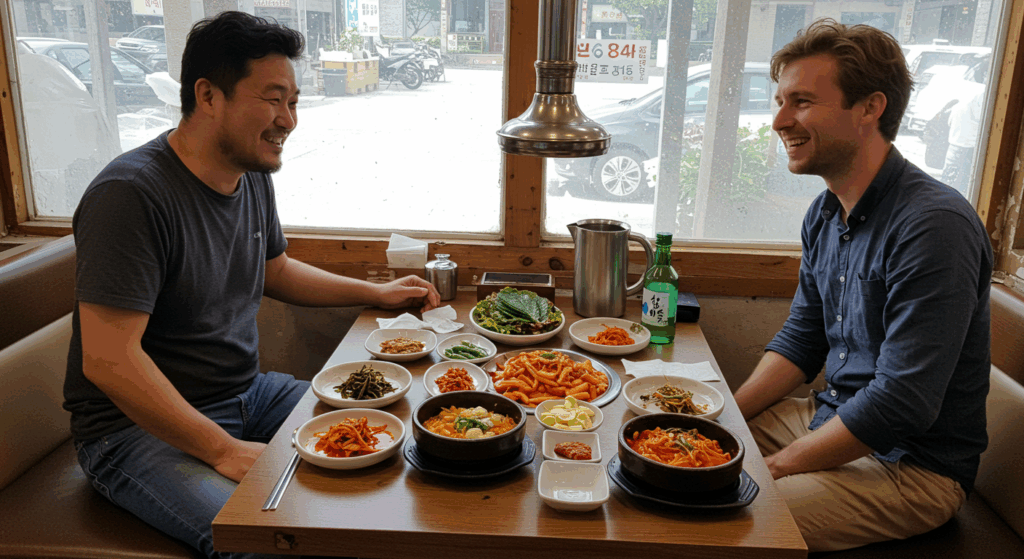
The first thing many foreigners (and even Koreans from other cities) notice about Busan is the accent — deep, rhythmic, and full of emotion.
People here don’t speak softly like Seoulites.
Our tone rises and falls like waves, our sentences are short and strong, and every word carries a kind of unfiltered sincerity.
When you first hear it, you might think Busan people sound angry.
But trust me — they’re probably just asking if you’ve eaten.
That’s how our warmth hides behind our volume.
In Busan dialect, “뭐하노?” (mwohano?) can mean anything from
“What are you doing?” to “Hey, how are you?” — depending on the smile behind it.
And when someone says “가자, 가자!” (Let’s go, let’s go!), it’s not a command — it’s excitement, an invitation to do something together.
The Busan dialect, or “satoori”, reflects who we are:
direct, honest, and emotionally open.
We don’t sugarcoat things, but we mean what we say.
If a Busan local says “괜찮다” (It’s okay), it often means,
“I’ll handle it, don’t worry.”
There’s pride in that — a quiet independence mixed with compassion.
Even foreigners who struggle with Korean often fall in love with this dialect.
It’s not just about language; it’s about energy.
You can feel someone’s mood from their voice alone — joy, frustration, affection — and that rawness is what makes Busan people so real.
Once you learn to recognize the rhythm of it, the accent stops sounding rough.
It becomes music — the sound of a city that has survived storms and still laughs loudly.
🏘️ 4. Finding Your Place in the City — From Outsider to “Our Person”
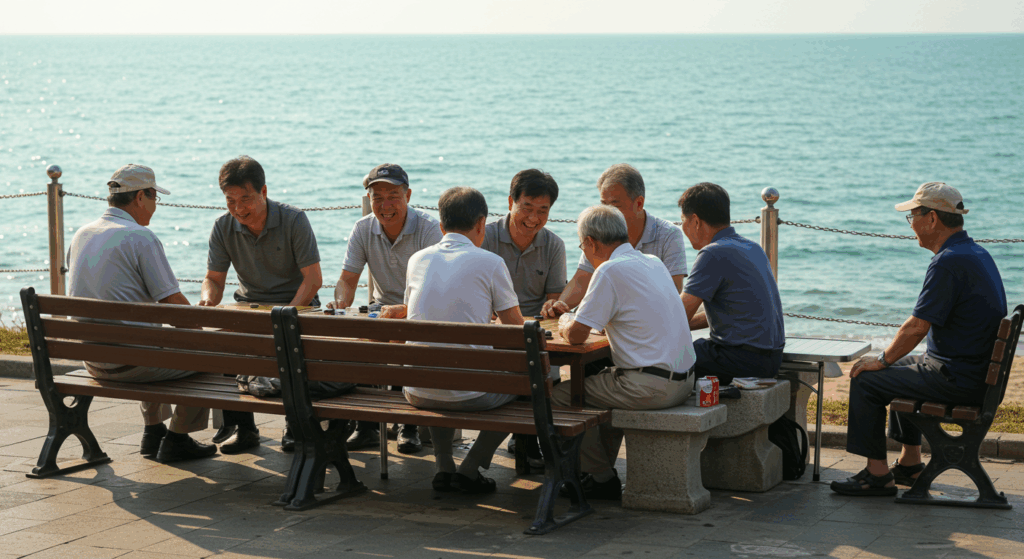
Busan might seem big on a map, but emotionally, it feels like a village.
People notice you — not in a nosy way, but in a caring one.
If you visit the same café twice, the barista will remember your order.
If you shop at the same fruit stand, the owner will probably give you an extra apple “because you smiled.”
At first, foreigners often tell me,
“People here seem tough… but somehow kind.”
That’s the perfect summary of Busan.
When you first move here, you might feel invisible — the language barrier, the different rhythm of life.
But over time, Busan quietly lets you in.
It doesn’t welcome you with loud festivals or posters.
It welcomes you through small, repeated kindnesses:
a taxi driver who teaches you a Korean word,
a neighbor who helps you carry your groceries up the hill,
a restaurant owner who waves when you pass by days later.
That’s how relationships start here — not quickly, but deeply.
Busan people use a special word for connection: “우리 (woori)”, which means “we” or “our.”
You’ll hear it everywhere:
“Our house,” “our school,” “our Busan.”
Even when talking to strangers, locals naturally include you in “we.”
It’s not just grammar — it’s a worldview.
To Busan people, belonging isn’t about where you were born,
it’s about who shares the same sea breeze.
And here’s the beautiful part: once you’re part of the circle,
you’re treated like family — sometimes too much!
Neighbors might check if you’ve eaten.
Coworkers might insist on buying dinner.
Ajummas (older ladies) might scold you for not wearing enough layers in winter —
not because they’re rude, but because they care.
That’s the Busan version of love — loud, protective, and endlessly genuine.
Living in Busan as a foreigner, you’ll realize that community doesn’t come from speaking perfect Korean or knowing every custom.
It grows from showing up, smiling, and being open.
Busan doesn’t need you to be fluent — it just needs you to be present.
And when a local calls you “우리 사람” — “our person” —
that’s when you’ll know you’ve truly found your place in this city.
☀️ 5. What Foreigners Usually Notice First — Five Small Surprises that Say a Lot
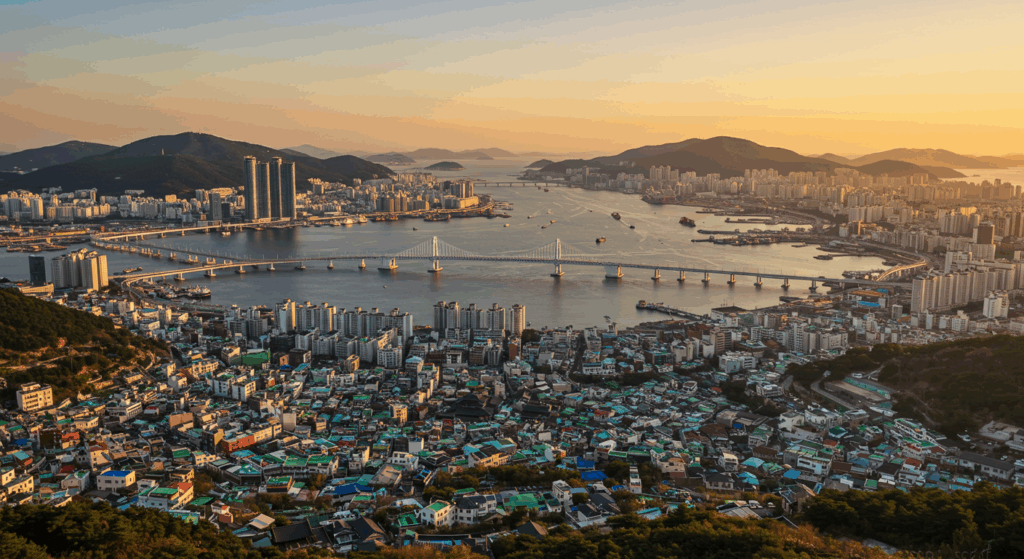
Whenever I talk with foreigners who just arrived in Busan, I always ask the same question:
“What surprised you the most about this city?”
And their answers, almost always, make me smile — because they describe the real Busan better than any guidebook ever could.
① “People speak so loudly… but they’re not angry!”
Yes — Busan people talk as if every conversation is happening over the sound of waves and wind.
It’s not rudeness; it’s rhythm.
Our voices rise with emotion, fall with humor, and fill the silence that big cities often fear.
Once you realize that a loud “야!” (Hey!) is just how we say hello, you’ll start laughing too.
② “The sea is always close — and it changes your mood.”
No matter where you are — downtown, in a café, or walking home — you’ll feel the sea’s presence.
For many foreigners, that’s the biggest difference from Seoul.
The ocean becomes part of your daily mental map, reminding you that life can still move gently.
③ “The food is simple but full of soul.”
Busan’s food isn’t fancy, but it’s unforgettable.
From a steaming bowl of dwaeji-gukbap to street-side eomuk (fish cake), everything feels made to comfort.
You can taste sincerity in the seasoning.
Locals might eat spicy cold noodles in winter or ice cream after dinner —
because here, there are no strict rules, only habits that make you smile.
④ “Coffee is a lifestyle, not a luxury.”
Foreigners are often surprised that there’s a café literally every 30 meters.
For Busan locals, coffee is how we pause.
We drink it after meals, during walks, at midnight, or even while watching the rain.
It’s not about caffeine — it’s about slowing down, together.
⑤ “I feel safe — even late at night.”
This is one of Busan’s quietest strengths.
Women walk alone near the beach at midnight.
Students return home on empty streets.
And if you look lost, someone will stop to help — even if they can’t speak English.
That sense of quiet safety is what makes foreigners say, “I could live here.”
In these small surprises, you see what Busan truly is:
a city of loud hearts, gentle rhythms, and open hands.
💬 Final Thoughts from a Busan Local — and Why I Started This Blog
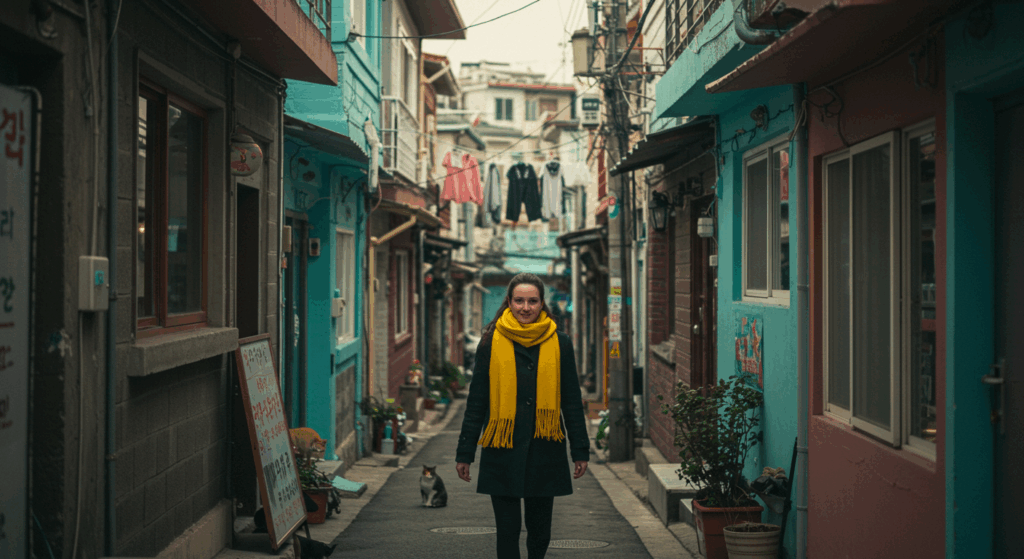
A few years ago, I met a French traveler sitting alone by the water at Gwangalli Beach.
He told me he had been to Seoul, Tokyo, and Hong Kong,
but Busan felt different.
He said,
“Here, people don’t try to impress you. They just live. And somehow, that makes you want to stay.”
That sentence became the seed for this blog.
I realized there are thousands of foreigners like him —
people living, studying, or just exploring Korea,
trying to understand this country beyond K-pop headlines or Seoul skyscrapers.
So I created Easy Korea Life —
a space where I share what everyday Korea really feels like, from my perspective as a Busan local.
Here, you’ll find not just “places to go,” but how people actually live,
what they eat, how they speak, and why they do the small things that make Korea quietly beautiful.
I write these stories because I believe understanding a place starts with understanding its people —
and Busan has some of the most open-hearted people you’ll ever meet.
So if you’re planning to visit, live, or just daydream about life in Korea,
come back here anytime.
There will always be another story, another neighborhood, another sunrise over the sea waiting for you.
Welcome to Easy Korea Life —
a Busan local’s guide to the heart of Korea. 🌊
For official tourism information, visit the Busan Tourism Organization.
#LivingInBusan #BusanLocalGuide #ExpatLifeKorea #LifeInKorea #BusanCulture #EasyKoreaLife #KoreanLifestyle #BusanVibes



